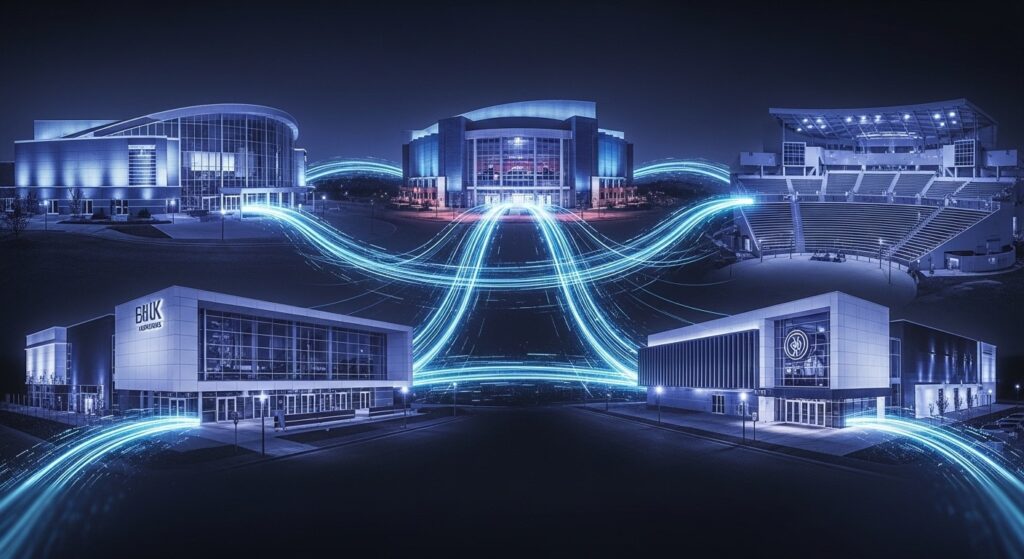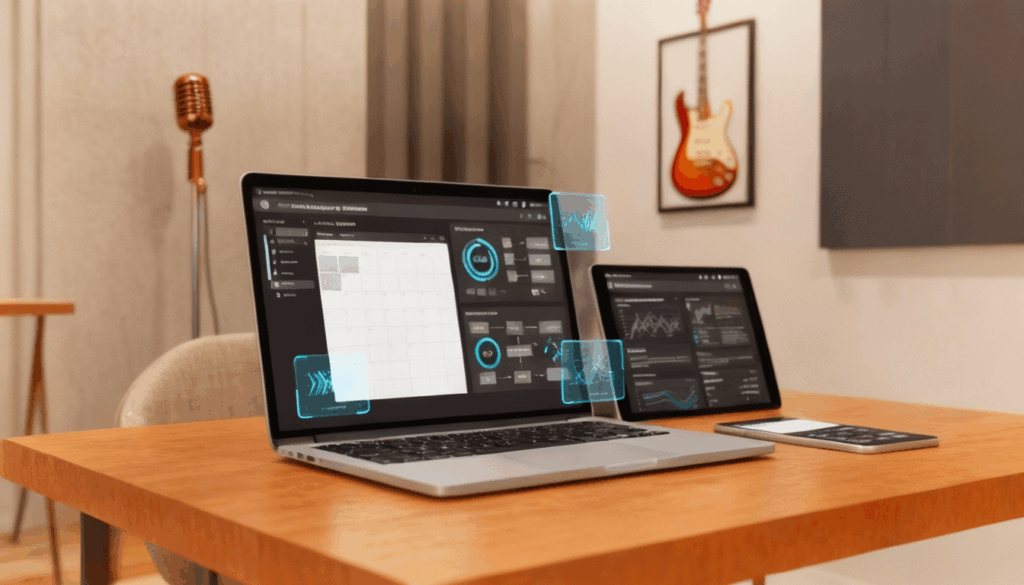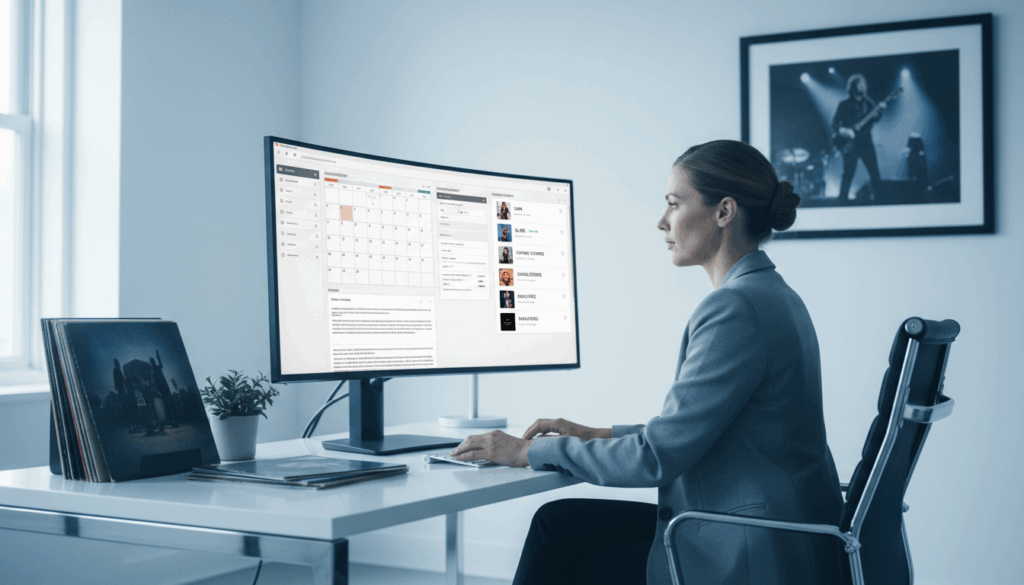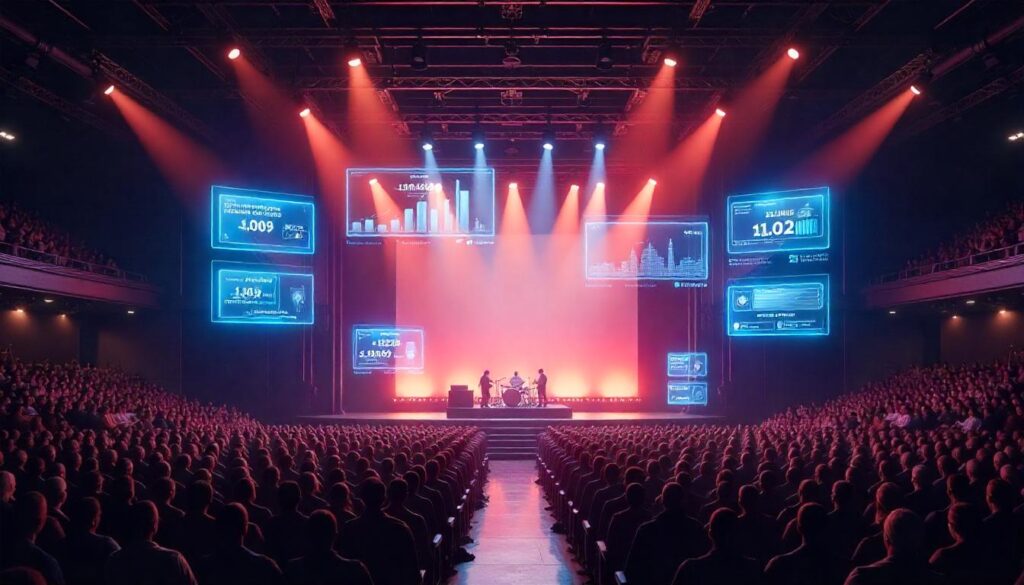
Integrating Ticketing with Music Management Software: A Seamless Experience
The Evolution of Music Venue Operations
Music venues face an increasingly complex operational landscape. With the live music industry experiencing unprecedented growth and Live Nation reporting a 36% increase in revenue from 2022 to 2023, venue operators are under pressure to streamline operations while delivering exceptional experiences. The secret to thriving in this competitive environment lies in comprehensive live music management software that seamlessly integrates all aspects of venue operations, especially ticketing systems.
Gone are the days when music venues could rely on disconnected tools and manual processes. Today’s most successful operators understand that fragmented systems create bottlenecks, increase errors, and ultimately limit their potential for growth. The integration of ticketing platforms with comprehensive venue management systems represents a fundamental shift toward operational excellence that’s reshaping how the industry operates.
The modern music business demands agility, precision, and the ability to make data-driven decisions in real-time. Venues that continue to operate with siloed systems find themselves struggling to keep pace with market demands, while those embracing integrated solutions are positioned to capitalize on every opportunity the booming live music market presents.
The Hidden Costs of Disconnected Systems
Operating with separate ticketing and management platforms creates more problems than many venue operators realize. When systems don’t communicate with each other, critical information gets trapped in silos, forcing staff to manually transfer data between platforms. This manual process isn’t just time-consuming—it’s a recipe for costly mistakes that can impact everything from financial reporting to customer satisfaction.
Consider the typical scenario: ticket sales data sits in one system while financial tracking happens in another, and calendar management occurs in a third platform. Staff members find themselves constantly switching between applications, copying and pasting information, and hoping nothing falls through the cracks. This disjointed approach not only wastes valuable time but also increases the likelihood of errors that can have serious financial implications.
The inefficiencies compound when you factor in the communication breakdowns that occur when different team members work with different systems. Marketing teams might not have real-time access to ticket sales data, while finance departments struggle to reconcile revenue across multiple platforms. These operational friction points create stress, reduce productivity, and ultimately impact the bottom line in ways that many venues don’t fully recognize until they experience the alternative.

Real-Time Financial Tracking: The Game Changer
When ticketing systems integrate seamlessly with live music management software, one of the most immediate benefits is real-time financial visibility. Instead of waiting until after events to understand revenue performance, venue operators can monitor ticket sales as they happen, adjusting marketing strategies and making informed decisions based on current data rather than outdated reports.
This real-time tracking capability extends far beyond simple sales monitoring. Automated financial reporting eliminates the soul-crushing work of manual number crunching, providing instant insights into profitability, cash flow, and revenue trends. When every ticket sale automatically updates financial dashboards, venue managers gain unprecedented visibility into their business performance.
The settlement process, traditionally one of the most time-consuming aspects of event management, becomes streamlined through integration. All parties—artists, vendors, and venues—receive accurate payments promptly because the system automatically calculates earnings based on real-time ticket sales data. This automation not only saves time but also builds trust with partners who appreciate the accuracy and transparency of automated settlements.
Advanced integrated systems can even provide predictive analytics, using historical ticket sales patterns to forecast revenue for upcoming events. This capability enables venue operators to make proactive decisions about marketing spend, staffing levels, and inventory management, maximizing profitability for every show.
Streamlined Operations Through Smart Integration
The operational benefits of integrated ticketing and management systems extend throughout every aspect of venue operations. Music management software features that include robust ticketing integration eliminate the need for staff to juggle multiple platforms, creating a unified workspace where all critical information is accessible from a single dashboard.
Calendar management becomes exponentially more effective when ticketing data flows seamlessly into scheduling systems. Venue operators can view available dates, confirmed shows, and on-sale dates across multiple venues or stages simultaneously. This comprehensive view prevents double-bookings while enabling quick identification of opportunities to maximize venue utilization.
Staff productivity increases dramatically when team members can access all necessary tools from one platform. Marketing teams can monitor ticket sales performance while adjusting promotional campaigns in real-time. Box office staff can manage walk-up sales, process refunds, and handle customer inquiries without switching between systems. Operations teams can coordinate logistics based on actual attendance numbers rather than estimates.
The collaboration benefits are equally significant. When all stakeholders work within the same system, communication improves naturally. Notes, documents, and critical information become centrally accessible, reducing the risk of important details getting lost in email chains or overlooked in separate systems. Effective collaboration features ensure everyone stays aligned throughout the event planning and execution process.

Enhanced Customer Experience Through Seamless Technology
Integration doesn’t just benefit venue operations—it dramatically improves the customer experience. When ticketing systems connect with comprehensive venue management platforms, customers enjoy smoother transactions, faster entry processes, and more personalized service. The online event ticketing market has reached $60.11 billion in 2024, demonstrating the critical importance of providing exceptional digital experiences.
Mobile optimization becomes crucial as more customers purchase tickets on their devices. Integrated systems can provide branded ticketing experiences that maintain consistency with venue websites and marketing materials. This seamless branding reinforces venue identity while providing customers with confidence in their purchase experience.
The check-in process benefits significantly from integration. Staff can quickly scan tickets, access customer information, and handle issues without delays. When problems arise, integrated systems provide immediate access to purchase history, enabling staff to resolve issues quickly and maintain customer satisfaction. Advanced systems can even provide demographic insights that help venues better understand their audiences and tailor future programming accordingly.
Customer data becomes a powerful asset when ticketing integrates with management systems. Venues can track customer preferences, purchase history, and attendance patterns to create targeted marketing campaigns and personalized recommendations. This data-driven approach to customer relationship management helps venues build loyalty while maximizing revenue from their most valuable patrons.
Data-Driven Decision Making in the Modern Music Industry
The ticketing industry is increasingly focused on sustainability and innovation, with 2025 trends emphasizing seamless experiences and data-driven insights. Integrated live music management software platforms provide the comprehensive analytics necessary to make informed decisions in this rapidly evolving landscape.
Revenue optimization becomes possible when venues can analyze ticket sales patterns across different types of events, pricing strategies, and marketing channels. This analysis helps identify the most profitable approaches for different scenarios, enabling venues to maximize revenue for every show. Understanding which marketing efforts drive the highest-value customers allows for more strategic allocation of promotional budgets.
Capacity planning benefits enormously from integrated data. Venues can analyze historical attendance patterns to predict demand for similar events, optimizing pricing strategies and staffing levels accordingly. This predictive capability helps prevent both overestimating demand (leading to disappointment) and underestimating popularity (resulting in missed revenue opportunities).
Market analysis becomes more sophisticated when ticketing data integrates with broader management systems. Venues can identify trends in customer preferences, evaluate the success of different programming approaches, and make strategic decisions about future bookings based on comprehensive performance data rather than gut feelings or incomplete information.
The Technology Behind Seamless Integration
Modern integration relies on robust APIs and cloud-based architectures that enable real-time data sharing between systems. The best venue management software includes native ticketing capabilities or seamless integration with leading ticketing platforms, eliminating the technical complexity that often derails integration efforts.
Security considerations become paramount when integrating financial and customer data across systems. Leading platforms employ enterprise-level security measures, including encrypted data transmission, secure payment processing, and compliance with industry standards for handling sensitive information. These security measures protect both venues and customers while enabling the data sharing necessary for effective integration.
Scalability remains a critical factor as venues grow and evolve. Integrated systems must accommodate increasing transaction volumes, additional venues, and expanding functionality without performance degradation. Cloud-based solutions typically provide the flexibility and scalability necessary to support growing businesses without requiring significant infrastructure investments.
Mobile accessibility ensures that venue staff can access critical information and perform essential functions from anywhere. Whether checking ticket sales from home, processing transactions at the venue entrance, or updating event details while traveling, mobile-optimized integrated systems provide the flexibility that modern music industry professionals require.
Financial Impact and ROI of Integration
The financial benefits of integrated ticketing and live music management software extend far beyond operational efficiency. Venues typically see immediate improvements in cash flow visibility, enabling better financial planning and resource allocation. Real-time revenue tracking helps identify underperforming events early, allowing for corrective action before losses accumulate.
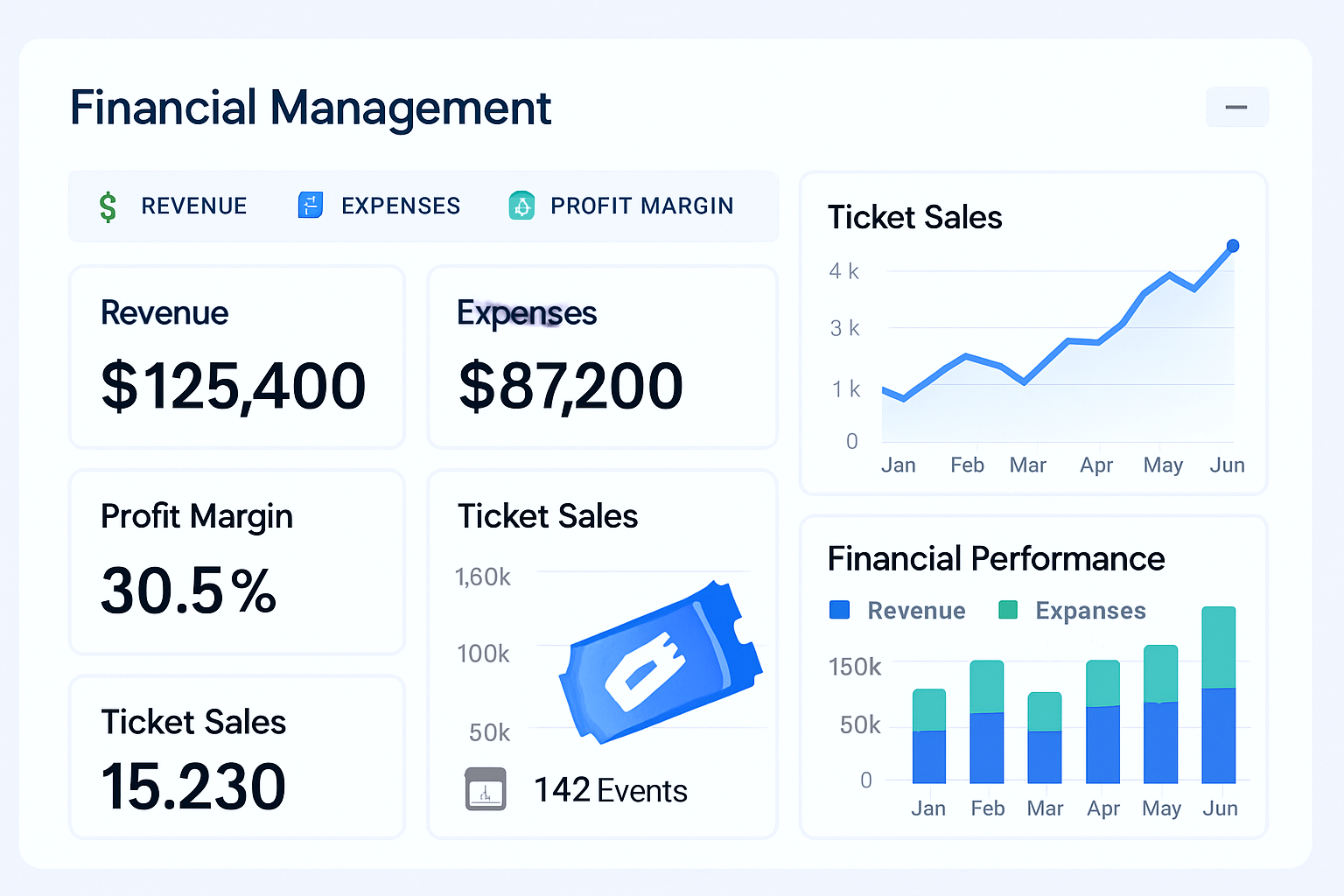
Cost reduction occurs through multiple channels. Staff productivity increases when employees spend less time on manual data entry and system switching. Error reduction saves money by preventing oversights that can lead to underpayments, double bookings, or customer service issues. Automated processes reduce the need for additional administrative staff as venue operations scale.
Revenue optimization opportunities emerge when venues have comprehensive visibility into all aspects of their operations. Effective financial management features enable venues to identify the most profitable events, optimize pricing strategies, and allocate resources more effectively. This strategic approach to revenue management can significantly impact overall profitability.
Long-term strategic benefits include improved partner relationships through accurate and timely settlements, enhanced customer loyalty through better service delivery, and competitive advantages through superior operational efficiency. These benefits compound over time, creating sustainable competitive advantages that can transform venue performance.
Implementation Best Practices for Seamless Integration
Successful integration requires careful planning and execution. Venues should begin by conducting a comprehensive audit of their current systems and workflows to identify integration points and potential challenges. Understanding how data currently flows through the organization helps inform the integration strategy and identify opportunities for improvement.
Staff training becomes crucial for successful implementation. Even the most sophisticated integrated system won’t deliver benefits if staff members don’t understand how to use it effectively. Comprehensive training programs should cover not just technical functionality but also new workflows and best practices for maximizing system benefits.
Data migration requires careful attention to ensure historical information transfers accurately to the new integrated system. This process should include verification procedures to confirm data integrity and backup protocols to protect against potential losses during the transition period.
Testing procedures should simulate real-world scenarios to identify potential issues before going live. This testing should include high-volume ticket sales periods, complex settlement scenarios, and integration with any existing third-party systems. Thorough testing prevents disruptions that could impact customer experience or venue operations.
Future Trends in Integrated Music Management
The integration landscape continues to evolve with emerging technologies and changing industry needs. Artificial intelligence and machine learning are beginning to play larger roles in predictive analytics, helping venues forecast demand more accurately and optimize pricing strategies dynamically.
Blockchain technology presents interesting possibilities for ticket authentication and transfer, potentially reducing fraud while creating new revenue opportunities through secure resale markets. These innovations may reshape how venues approach ticketing while maintaining the need for integrated management systems.
Social media integration is becoming more sophisticated, with venues leveraging social platforms to drive ticket sales and enhance customer engagement. Integrated systems that can automatically post event updates, track social media ROI, and integrate social proof into the ticket purchasing process will provide competitive advantages.
Virtual and hybrid events represent another frontier where integrated systems will play crucial roles. As venues expand their offerings to include streaming components, integrated platforms will need to manage both physical and digital attendance while providing comprehensive analytics across all revenue streams.
Measuring Success: Key Performance Indicators
Venues implementing integrated ticketing and management systems should track specific metrics to measure success and identify areas for continued improvement. Revenue per event provides a clear indicator of whether integration is driving financial performance improvements. This metric should be tracked against historical baselines to demonstrate the impact of integration.
Operational efficiency metrics include time spent on administrative tasks, error rates in financial reporting, and staff productivity measures. These metrics help quantify the operational benefits of integration while identifying areas where additional training or system optimization might be beneficial.
Customer satisfaction indicators such as transaction completion rates, customer service resolution times, and repeat attendance rates reflect whether integration improvements translate into better customer experiences. These metrics are often leading indicators of long-term venue success.
System utilization rates help ensure that integrated capabilities are being fully leveraged. Tracking which features are most heavily used and which remain underutilized can inform additional training needs or system optimization opportunities.
The Path Forward for Modern Venues
The integration of ticketing with comprehensive management systems represents more than just a technological upgrade—it’s a strategic imperative for venues serious about competing effectively in today’s dynamic music industry. As customer expectations continue to rise and operational complexity increases, venues that maintain disconnected systems will find themselves at a significant disadvantage.
The benefits of integration extend throughout every aspect of venue operations, from improved financial visibility and streamlined workflows to enhanced customer experiences and data-driven decision making. These advantages compound over time, creating sustainable competitive benefits that can transform venue performance and profitability.
For venues ready to embrace this transformation, Prism offers the industry’s most comprehensive live music management software platform, specifically designed to integrate all aspects of venue operations into a seamless, powerful solution that empowers music industry professionals to focus on what they do best—creating unforgettable live music experiences. Contact us today to schedule a demo and see how it works.

Matt Ford is the founder and CEO of Prism.fm, an Austin-based software company revolutionizing live music event management. With a background in entrepreneurship and a degree from the University of Wisconsin-Madison School of Business, Ford combined his self-taught coding skills with firsthand experience as a concert promoter to address the inefficiencies he observed in the industry. In 2018, he launched Prism.fm, an all-in-one platform designed to streamline operations for venues, promoters, and agencies by replacing cumbersome spreadsheets with integrated tools for booking, financial tracking, and contract management. Under his leadership, Prism.fm has grown significantly, achieving $3 million in annual recurring revenue post-COVID and securing over $15 million in funding . Ford’s commitment to building user-centric solutions has positioned Prism.fm as a trusted partner for over 1,500 venues and promoters worldwide.

